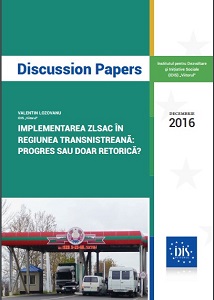Implementarea ZLSAC în regiunea Transnistreană: progres sau doar retorică?
DCFTA implementation in the Transnistrian region: progress or just rhetoric?
Author(s): Valentin Lozovanu
Subject(s): International relations/trade, EU-Approach / EU-Accession / EU-Development, Peace and Conflict Studies
Published by: IDIS VIITORUL Institutul pentru Dezoltare şi Initiative Sociale
Keywords: DCFTA; regional cooperation; Transnistria-conflict;
Summary/Abstract: In all probability, Chisinau's strategy was to gradually integrate the Transnistrian economy into a single economic and legal space by signing and implementing AA56. At the same time, Tiraspol, which obstructed the negotiations in the working groups by delegating a single person (lower rank), tried to extend the PCA to postpone the application of DCFTA and obtain unilateral concessions from the EU and the Chisinau authorities. . The EU avoided a crisis in the wake of the withdrawal of trade preferences for exports from the Transnistrian region in order not to antagonize Russia7 and to maintain the instrument of soft power by intensifying economic ties on both banks of the Dniester, involving the region's business and civil society. However, in view of the fact that the authorities in the region will not agree to apply the commitments agreed in the roadmap for the two-year period (or will do so incompletely, avoiding more sensitive areas for the EU) both Moldova, which has committed itself to apply the provisions throughout its territory (but which does not have the possibility to exercise regular control8), as well as the EU will be in a difficult situation. Chisinau began applying customs controls at its borders in 2006 to check goods that are imported and exported from / to the Transnistrian region and thereby, indirectly, ensures the adoption of rules of origin in areas it does not control. 9 However, even if customs control is exercised at the border and unofficially and limited to certain undertakings in the region, these arrangements cannot ensure comprehensive monitoring at all stages of rules of origin and quality standards (sanitary and phytosanitary). in the technological process of production10. Moreover, there are a number of other measures related to the harmonization of the legislative and policy framework with that of the EU (part of the conditions in the roadmap) in terms of competition, intellectual property rights, procurement, customs administration, etc. whose implementation does not depend on the private sector but on the activity of the institutions. One year after the decision, it remains unclear both the progress of implementing these requirements in the Transnistrian region (to maintain the possibility of exporting to the EU) and the prospects of this compromise as Chisinau and Tiraspol look in different directions (EU and EUE). -a complicated regional economic context.
Series: IDIS DIscussion Papers
- Page Count: 46
- Publication Year: 2016
- Language: Romanian
- Content File-PDF

